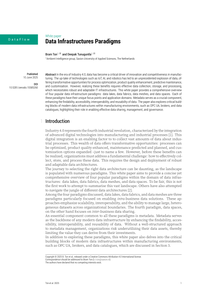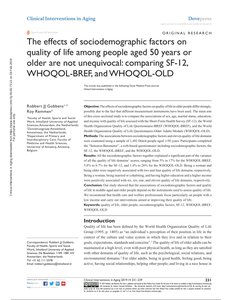Experts like Jouslin de Noray, Shiba and Hardjono discern three paradigms in quality management: control, continuous improvement and breakthrough. Van Kemenade argues that before being able to reach breakthrough you need another paradigm: commitment.
DOCUMENT

In the era of Industry 4.0, data has become a critical driver of innovation and competitiveness in manufacturing. The up-take of technologies such as IoT, AI, and robotics has led to an unprecedented explosion of data, offering transformative opportunities for process optimization, product quality enhancement, predictive maintenance, and customisation. However, realizing these benefits requires effective data collection, storage, and processing, which necessitates robust and adaptable IT infrastructures. This white paper provides a comprehensive overview of four popular data infrastructure paradigms: data lakes, data fabrics, data meshes, and data spaces. Each of these paradigms have their unique focus points and application domains. Metadata serves as a crucial component, enhancing the findability, accessibility, interoperability, and reusability of data. The paper also explores critical building blocks of modern data infrastructures within manufacturing environments, such as OPC UA, brokers, and data catalogues, highlighting their role in enabling effective data sharing, management, and governance.
MULTIFILE

from the article: Abstract Based on a review of recent literature, this paper addresses the question of how urban planners can steer urban environmental quality, given the fact that it is multidimensional in character, is assessed largely in subjective terms and varies across time. The paper explores three questions that are at the core of planning and designing cities: ‘quality of what?’, ‘quality for whom?’ and ‘quality at what time?’ and illustrates the dilemmas that urban planners face in answering these questions. The three questions provide a novel framework that offers urban planners perspectives for action in finding their way out of the dilemmas identified. Rather than further detailing the exact nature of urban quality, these perspectives call for an approach to urban planning that is integrated, participative and adaptive. ; ; sustainable urban development; trade-offs; quality dimensions
DOCUMENT

Kwaliteit in het algemeen, maar zeker in het hoger onderwijs, gaat om waarden. Hardjono, Shiba en Jouslin de Noray, allen verbonden aan de European Organisation for Quality definieren drie waardenorientaties in kwaliteitsmanagement: control, continue verbetering en breakthrough. In deze introductie op het boek een verheldering van deze drie paradigma's.
DOCUMENT
There are lots of definitions of quality, and also of quality in education. Garvin (1984)discerns five approaches: the transcendental approach, the product-oriented approach, the customeroriented approach, the manufacturing-oriented approach and the value-for-money approach. Harvey and Green (1993) give five interrelated concepts of quality as: exceptional, perfection (or consistency), fitness for purpose, value for money and transformative. A new definition of quality is needed to explain recent quality issues in higher education. This article describes a quality concept with four constituents: object, standard, subject and values. The article elaborates on the values. Four value systems derived from Beck and Cowan (1996) are transformed into four value systems on quality and quality management: control, continuous improvement, commitment and breakthrough. These value systems make it possible to explain some recent developments in quality management in higher education.
DOCUMENT

Times a changing. Mangement roles change. Quailty managers more an more are change managers and need soft skills to perform well.
MULTIFILE
A keynote address, introducing the pdca quality systeem into education in prosthetics and orthotcs.
DOCUMENT

Een holistisch perspectief op binnenstedelijke herontwikkeling Spatial Planning http://www.uu.nl/agenda/promotie-een-holistisch-perspectief-op-binnenstedelijke-herontwikkeling Promovendus Rien van Stigt onderzoekt waarom het moeilijk is om milieukwaliteit een prominente plaats te geven in de besluitvorming over ruimtelijke plannen. In zijn proefschrift ontwikkelt hij een holistisch perspectief op het complexe proces van compacte binnenstedelijke herontwikkeling. De kwaliteit van de stedelijke leefomgeving is essentieel in duurzame stedelijke ontwikkeling. Die kwaliteit staat met name bij compacte binnenstedelijke herontwikkeling onder druk, en daarom is milieukwaliteit een belangrijke factor in het plannen van zulke ontwikkelingen. Uit de literatuur over de integratie van milieubeleid blijkt dat dit, vooral op lagere bestuurlijke niveaus, niet altijd goed lukt. Er is nog geen overtuigende verklaring waarom dit zo is. Promotor(es): Prof.dr. P.P.J. Driessen en Prof.dr. T.J.M. Spit
DOCUMENT

Objective: The effects of sociodemographic factors on quality of life in older people differ strongly, possibly due to the fact that different measurement instruments have been used. The main aim of this cross-sectional study is to compare the associations of sex, age, marital status, education, and income with quality of life assessed with the Short-Form Health Survey (SF-12), the World Health Organization Quality of Life Questionnaire-BREF (WHOQOL-BREF), and the World Health Organization Quality of Life Questionnaire-Older Adults Module (WHOQOL-OLD). Methods: The associations between sociodemographic factors and eleven quality of life domains were examined using a sample of 1,492 Dutch people aged $50 years. Participants completed the “Senioren Barometer”, a web-based questionnaire including sociodemographic factors, the SF-12, the WHOQOL-BREF, and the WHOQOL-OLD. Results: All the sociodemographic factors together explained a significant part of the variance of all the quality of life domains’ scores, ranging from 5% to 17% for the WHOQOL-BREF, 5.8% to 6.7% for the SF-12, and 1.4% to 26% for the WHOQOL-OLD. Being a woman and being older were negatively associated with two and four quality of life domains, respectively. Being a woman, being married or cohabiting, and having higher education and a higher income were positively associated with six, six, one, and eleven quality of life domains, respectively. Conclusion: Our study showed that the associations of sociodemographic factors and quality of life in middle-aged and older people depend on the instruments used to assess quality of life. We recommend that health care and welfare professionals focus particularly on people with a low income and carry out interventions aimed at improving their quality of life.
DOCUMENT

From the article : "Based on a review of recent literature, this paper addresses the question of how urban planners can steer urban environmental quality, given the fact that it ismultidimensional in character, is assessed largely in subjective terms and varies across time. A novel perspective of urban environmental quality is proposed, simultaneously exploring three questions that are at the core of planning and designing cities: ‘quality of what?’, ‘quality for whom?’ and ‘quality at what time?’. The dilemmas that urban planners face in answering these questions are illustrated using secondary material. This approach provides perspectives for action. Rather than further detailing the exact nature of urban quality, it calls for sustainable urban environmental quality planning that is integrated, participative and adaptive" ( wileyonlinelibrary.com ) DOI: 10.1002/eet.1759 - Preprint available for free download.
DOCUMENT
